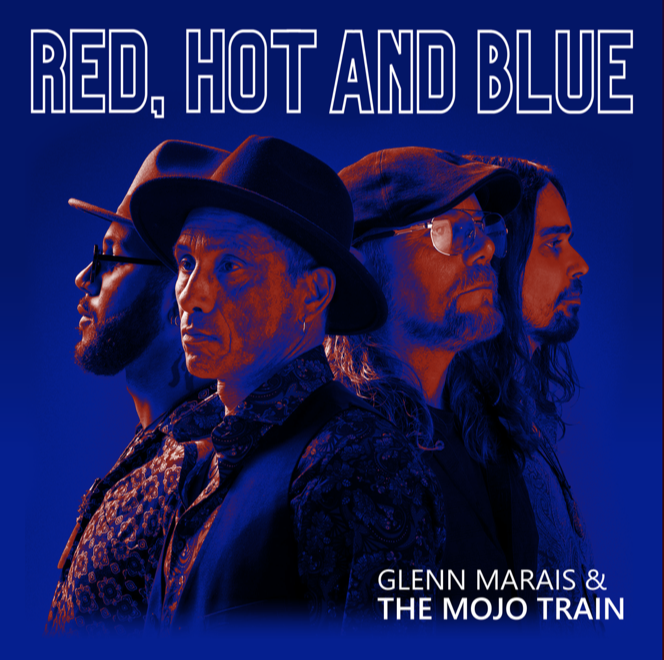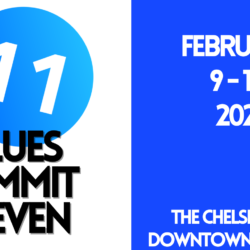May 2024 – Glenn Marais & the Mojo Train
It’s not easy to settle on a genre that defines Red, Hot and Blue the latest album from Newmarket, Ontario’s Glenn Marais & the Mojo Train. Is it blues? Funk? Rock? R&B? Yes.
If you’ve ever met Marais, you’ll know that the Juno-nominated singer-songwriter likes to colour outside the lines. Saying that his band’s new album doesn’t easily fit into any one musical genre probably won’t bother him at all.
You’ll hear it in Marais’ cackling laugh. He likes to mess with people. For sure, he likes to get people moving, dancing and singing, but the artist in him also likes to challenge people.
Marais does this on multiple levels: in his songwriting and music, but also with his poetry, with the story and characters in his award-winning play JOOK, and in anti-racism and anti-bullying performances he delivers in schools throughout Ontario.
So how are Marais and the Mojo Train “messing with us” with their latest album “Red, Hot and Blue”?
I caught up with Marais recently to capture some of his thoughts behind the band’s latest album. He and the Mojo Train were fresh off a trip where the band performed many of the songs on their new album en route to reaching the semi-finals in the International Blues Competition in Memphis, Tenn.
“This time around, it’s all about love,” said Marais with a laugh. “Love denied, love discovered. I’m in a better place now than I was and that’s reflected in the writing and in the music. I’m more comfortable now with who I am, and being more loving. I’m learning to appreciate the moment more.”
Marais said recovering from the grief of losing his brother and mother had a profound effect on him. “My brother Andre was always pushing me, saying ‘you hold back too much.’ I don’t play the same way now. I’m much more uninhibited.”
Marais said part of opening up was allowing more room for his bandmates to get involved with this album. “We started to change the way we were doing things,” he said. “It was more collaborative. Before I would just try to do everything, even things like fundraising and merchandising. It wasn’t effective and it was frustrating me.”
This openness is reflected in the album’s sound, with bandmates taking a much more active role in lyrics, and in the directions of songs.
Performing on Red, Hot and Blue are the Mojo Train regulars: drummer Jeff Saulnier, bassist Manny DeGrandis, and keyboard player Jesse Karwat (who recently played keys on tour with I Mother Earth). Other session musicians Mike Stevens who played harmonica on some tracks and former Mojo member Nick Bogoeff who played flute and sax. The album was produced by Karwat and Marais and mastered by Adam Ayan.
“This is really a band album. Each of us was fully involved for the whole recording,” said DeGrandis. “The album shows exactly what we are like now as a band. High energy, funky catchy hooks with a blues rock base.”
DeGrandis said the pandemic shut down the band in the middle of recording the album, but it ended up working out for them, because it gave them time to keep improving the songs. “We would record a couple songs at a time, work on finishing them, and then hit another couple of songs. A lot of times bands need to rush recording their albums because of time or financial constraints.”
Marais said four of the songs on the new album were born during sound checks. “There is a loose atmosphere during sound check in the way we interact. You are just feeling everything. There’s a lot of work to get everything set up, and now we just get to play and be creative,” he said.
The Mojo Train has been playing together for more than a decade and it shows on the album and in their live performances. For a band fully capable of jamming and improvising for hours at the drop of a hat, they are tightly-connected on the new album. Even though Marais is a skilled lead guitarist known for blistering solos, he’s reined it in on the album, all in the support of keeping the vibe and elevating the songs.
This self restraint lets the listener glide along on a rhythmic wave, hearing each of the instruments clearly and with the vocals well up in the mix to deliver the nuance and emotion to deliver the message behind the music.
But the band’s irrepressible energy can only be contained for so long, and when the dynamics shift on the title track Red, Hot and Blue, the slow ride on the Mojo Train speeds into full-blown blues rock, ending only after an emotion-packed and lengthy note held by Marais that ends the song.
The Delta Blues make more than just a guest appearance on the album with the track “It All Went Down”, a heavier rhythmic number with a driving beat with a wailing harmonica trying desperately to be heard in the mix, like a suppressed cry.
“That’s Where My Mojo’s At” showcases the band’s strengths as a high energy live act, and is the song they used to kick off their performances in the Memphis blues competitions. The strength of the band’s rhythm section shines through with DeGrandis’ driving bass and Saulnier’s drumming holding the ship steady while Marais unleashes his Strat and delivers some tasty licks.
On “Love, Sweet Love”, the band switches it up again and delivers a Stevie Wonder vibe that would have been perfectly happy lighting up radio stations in the 70s. It’s a tune that just makes you want to smile and clap along.
On “Pink Lemonade”, the band veers into pop terrain with a punchy beat and “fluffier” lyrics, with Marais reminiscing about youthful days drinking pink lemonade, giving us a break from the heavier themes, and taking us back to a time when life was less serious and less complicated.
“The Song of Love” is a sleepy blues burner that would be perfectly suited for an upscale coffee house or jazz bar. Horns make an appearance, adding to the jazzy feel, and even the guitar licks are slow and yearning, adding new musical directions.
Red, Hot and Blue won’t be for everyone’s taste, because while the album holds together, it crosses into different musical lanes.
Even in Memphis, the band’s genre-fluidity probably kept them from advancing further in the competition because the judges didn’t quite know what to do with a band whose driving energy ignited the crowds in the Beale Street clubs, but did so outside the familiar confines of the 12-bar blues.
But Glenn Marais and the Mojo Train don’t like to play by the rules, they set their own and take what comes their way, which is usually praise and more fans.
For more Mojo Train, check out the band’s other albums released in 2017, “The Mojo Train” and a live Delta Blues Record “Preachin’ From Down Low.”
(Todd Phillips toddphillips.ca tphillips@fast4word.com)










